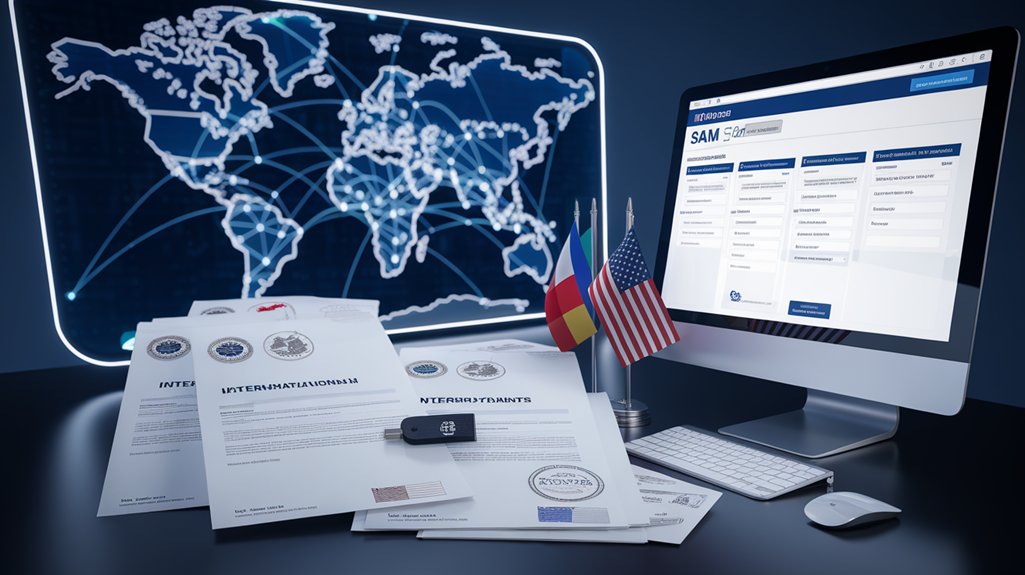Any entity seeking federal funding or contracts must obtain a UEI through SAM registration. This requirement encompasses state and local governments, educational institutions, nonprofit organizations, and businesses interacting with federal agencies. The UEI replaced the DUNS number as the primary identification method for federal transactions. Registration is free but requires specific documentation based on organization type and can take up to three weeks to complete. Further details explain validation requirements for different entity categories.
Table of Contents
ToggleFederal Funding Recipients and Their UEI Requirements

When organizations seek federal funding, they must obtain a Unique Entity Identifier (UEI) through the System for Award Management (SAM) registration process. This requirement applies to all entities pursuing federal assistance, including state and local governments, educational institutions, and non-profit organizations.
The UEI serves as a critical identifier for processing grant applications and financial transactions with the federal government. Federal contractors must secure a UEI before bidding on government contracts, while grant applicants need one to submit proposals through Grants.gov. This 12-digit UEI number replaced the previously used 9-digit DUNS number.
A UEI is essential for federal transactions, required before bidding on contracts or submitting grant proposals.
Small businesses engaging in government contracting and individual applicants pursuing personal grants must also comply with this requirement. Organizations should designate an E-Business POC during the registration process to manage access and roles within the system.
Registration typically takes up to three weeks to complete and requires annual renewal, though the process is provided at no cost to applicants. The transition to UEI has enhanced security features while eliminating the need for third-party involvement that was previously required with the DUNS Number system.
Essential Steps for International Entities Seeking SAM Registration

The registration process for international organizations requires several additional steps beyond those mandated for domestic entities.
Foreign applicants must first obtain an NCAGE code through NATO’s Support and Procurement Agency before initiating SAM.gov registration. This prerequisite guarantees proper international identification within federal systems.
During international registration, entities must submit compliance documentation including government-issued business registration certificates, physical address verification, and a notarized letter appointing an Entity Administrator. Non-U.S. businesses are eligible to register on the SAM platform, which promotes international competition and collaboration.
All documentation must match the legal business name exactly as it appears on official records.
Unlike domestic registrants, international entities undergo additional verification processes, including geolocation validation and document certification requirements.
This new UEI system has replaced the DUNS number to promote transparency and reduce administrative burdens for all federal award recipients.
Following successful registration, the system automatically generates a UEI, which replaces the previously required DUNS number for all federal award transactions.
UEI Validation Process for Different Organization Types

Various organization types require distinct validation procedures when obtaining a Unique Entity Identifier (UEI) through SAM.gov registration.
Domestic businesses must undergo mandatory UEI validation using their IRS-issued EIN and business registration documents, with processing typically completed within seven days when documentation is accurate.
Nonprofit organizations follow a specialized process requiring 501(c)(3) certification documents, state charitable registrations, and IRS determination letters confirming active tax-exempt status.
Government entities must submit official resolutions or ordinances, while higher education institutions need IPEDS ID validation and accreditation documentation.
Foreign-based entities face additional requirements, including obtaining an NCAGE code before SAM.gov validation and providing translated, notarized documents for non-English materials.
Each organization type must address specific validation criteria to successfully complete SAM registration.
The UEI has completely replaced DUNS numbers as the primary identification method for all entities seeking to do business with the federal government.
Frequently Asked Questions
How Long Does a UEI Remain Valid Before Requiring Renewal?
The UEI number itself never expires once assigned to an entity.
However, entity registrations in SAM.gov expire annually and require renewal every 365 days to maintain active status.
The renewal process must be completed before the expiration date to guarantee continuous compliance.
While the UEI validity duration is permanent, the associated SAM.gov registration requires yearly renewal.
Organizations can verify their expiration date through the SAM.gov lookup tool or within their entity record.
Can Entities Obtain a UEI Without Internet Access?
No, entities cannot obtain a UEI without internet access.
SAM.gov offers no offline registration alternatives or alternative methods for UEI registration. The entire process requires internet connectivity as it depends on Login.gov credentials, which need email and two-factor authentication.
Entity validation occurs through real-time database matching, and all documentation (TIN verification, banking information, NAICS codes) must be submitted electronically.
The Federal Service Desk provides support for technical issues, but cannot process registrations offline.
Are There Costs Associated With UEI Registration and Maintenance?
UEI registration through SAM.gov has no registration fees associated with it.
The entire process of obtaining, maintaining, and renewing a UEI number is completely free. However, entities should be aware that some third-party services charge fees to assist with the registration process and maintenance.
These vendor services are optional, not required. All official UEI registration activities can be completed at no cost directly through the SAM.gov website.
What Happens if SAM.Gov Registration Expires During a Contract?
When SAM.gov registration expires during a contract, several serious contract implications occur.
Payment processing may halt immediately, and the contractor becomes ineligible for modifications or extensions.
The registration process must be completed promptly to restore active status. Ongoing work may continue, but administrative functions face disruption.
Federal agencies cannot authorize new work with contractors having expired registrations.
This situation strains relationships with federal partners and may create compliance risks under FAR regulations.
Can Multiple Organizations Share a Single UEI Number?
Multiple organizations cannot share a single UEI number, even under shared ownership arrangements.
UEI limitations explicitly require each entity to maintain its own unique identifier for SAM.gov registration purposes.
Parent companies, subsidiaries, and affiliated organizations must each obtain separate UEIs regardless of their organizational hierarchy.
The system architecture has no provision for cross-registration UEI sharing, and attempting to use a single UEI across multiple registrations would violate federal compliance requirements for entity identification.